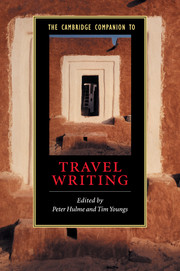Introduction
Published online by Cambridge University Press: 28 May 2006
Summary
‘There is no foreign land; it is only the traveller that is foreign’
(Robert Louis Stevenson)Travel has recently emerged as a key theme for the humanities and social sciences, and the amount of scholarly work on travel writing has reached unprecedented levels. The academic disciplines of literature, history, geography, and anthropology have all overcome their previous reluctance to take travel writing seriously and have begun to produce a body of interdisciplinary criticism which will allow the full historical complexity of the genre to be appreciated.
The absence within the academy of a tradition of critical attention to travel writing means that this Companion, unlike most others in the series, whose areas of study are well-defined, has to bring its subject into focus in order to ‘accompany’ it. As a result, our volume offers only a tentative map of a vast, little-explored area. As far as practicable, we have opted for a broad definition of travel writing, with the huge range of potential texts leading us to focus on major shifts, on kinds and forms, on places written about, and on exemplary instances, rather than on particular travel writers. The two major limitations we have worked within are concentrations on the period since 1500 and on travel writing in English and published in Britain. The Anglocentric concentration is by no means exclusive: non-English travel writing has often been influential in Britain, with translations appearing soon after original publication, and travel writing has played an important rôle in recent years in the creation of an international literary field, so it would not make sense to operate rigid principles of exclusion.
- Type
- Chapter
- Information
- The Cambridge Companion to Travel Writing , pp. 1 - 14Publisher: Cambridge University PressPrint publication year: 2002
- 16
- Cited by



